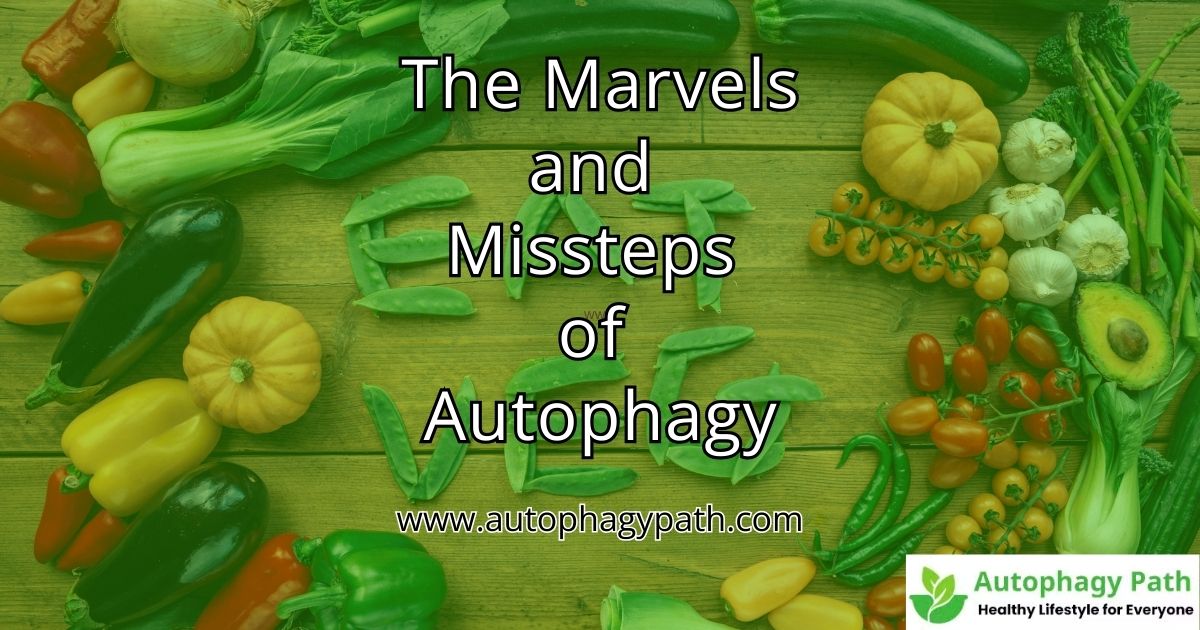How Long Should You Fast on Autophagy
Welcome to a deep dive into the fascinating world of holistic lifestyle functions! Have you ever wondered How Long Should You Fast on Autophagy at cellular level?
In this blog post, we will explore the science behind autophagy, the role of fasting in triggering this process, different fasting durations, and practical tips for incorporating fasting into your routine. Whether new to fasting or looking to optimise your fasting practices, this guide is for you.
Table of Contents
How Long Should You Fast on Autophagy – An Understanding
Autophagy, derived from the Greek words “auto” (self) and “phagein” (to eat), is a natural cellular process that involves the recycling and removal of damaged or dysfunctional components within cells.
Think of it as a cellular cleaning mechanism that helps maintain cellular health and functionality. Research has linked autophagy to various health benefits, including improved immune function, longevity, weight loss, and protection against certain diseases like cancer and neurodegenerative disorders.

Keep away the fasting myth in Triggering Autophagy
While autophagy occurs naturally in the body, certain factors can enhance or stimulate this process. One such factor is fasting.
When you fast, especially for extended periods, your body experiences a metabolic shift, where it depends on stored energy sources like fat for fuel.
This metabolic state, known as ketosis, has been shown to up-regulate autophagy, kickstarting the cellular cleanup process.
Different Fasting Durations and Autophagy
The duration of fasting plays a crucial role in determining the extent of autophagy activation. Studies have shown that shorter fasting periods, such as intermittent fasting (IF), where you fast for 16-18 hours daily, can still promote autophagy to some degree. However, long fasting periods, such as 24 hours or more, induce more robust autophagic activity.
Practical Tips for Fasting
If you are considering incorporating fasting into your lifestyle to harness the benefits of autophagy, here are some practical tips to help you get started:
- Start slow: If you are new to fasting, begin with shorter fasting windows and gradually increase the duration as your body adapts.
- Stay hydrated: Drink plenty of water during fasting periods to stay hydrated and support overall health.
- Focus on nutrient-dense foods: When you break your fast, prioritise whole foods rich in nutrients to nourish your body.
- Listen to your body: Your body responds to fasting and adjusts accordingly. Fasting should not cause excessive stress or discomfort.
The Impact of Nutrient Availability on Autophagy:
One of the salient factors influencing autophagy is the availability of nutrients in the human body. When nutrients are abundant, such as after a meal, the mTOR (mechanistic target of rapamycin) pathway is activated.
This pathway inhibits autophagy by cautioning that the cell has enough resources and doesn’t need to engage in self-cleaning processes. On the other hand, during fasting or periods of nutrient scarcity, mTOR activity decreases, allowing autophagy to proceed more efficiently. It highlights the dynamic interplay between nutrient availability and cellular maintenance mechanisms.
The Influence of Exercise in Autophagy Activation
In addition to fasting, exercise has also influenced autophagy. Physical activity, especially high-intensity exercise or resistance training, can stimulate autophagic processes in muscle cells.
Exercise-induced autophagy helps remove damaged organelles and proteins, contributing to muscle repair and adaptation. The combination of fasting and exercise may synergistically enhance autophagy, promoting overall cellular health and resilience.
Healthy Aging Changes in Autophagy
Autophagy plays a crucial role in combating age-related cellular decline. As we age, there is a natural decline in autophagic activity, leading to damaged cellular components and impaired cellular function.
This decline in autophagy is associated with various age-related diseases, including neurodegenerative disorders like Alzheimer’s and Parkinson’s disease. Strategies of autophagy, such as fasting and dietary interventions, may help mitigate age-related decline and promote healthy aging.
The Impact of Dietary Factors on Autophagy
While fasting is a potent trigger for autophagy, certain dietary factors can also influence this process. For example, caloric restriction diets, which have overall calorie intake restrictions, enhance autophagy and extend lifespan in various organisms.
Additionally, specific nutrients and compounds, such as polyphenols found in fruits and vegetables, resveratrol in red wine, and curcumin in turmeric, have been studied for their potential to modulate autophagic pathways.
Autophagy and Cellular Stress Response
Autophagy is the cellular stress response. When cells experience oxidative stress, nutrient deprivation, or protein misfolding, autophagy is a protective mechanism.
Autophagy helps cells cope with stress and maintain homeostasis. Disregulation of autophagy can contribute to cellular dysfunction and the development of various diseases, highlighting the importance of maintaining a balanced autophagic response.
Intermittent Fasting Protocols and Variations
Within the realm of fasting, there are various protocols and approaches that individuals can explore based on their preferences and health goals. Intermittent fasting (IF) is a popular approach involving different durations of fasting cycling between periods of fasting and eating.
Intermittent Fasting (IF) protocols include the 16/8 window hour fast method. (fasting for 16 hours, eating within an 8-hour window), the 5:2 method (eating for five consecutive days, restricting calorie intake on two non-consecutive days), and alternate-day fasting (alternating between fasting days and regular eating days).
Each protocol may have distinctive effects on autophagy and metabolic health, allowing individuals to find a fasting regimen that suits their lifestyle.
Autophagy and Disease Prevention
Emerging research suggests that enhancing autophagy through lifestyle interventions like fasting may offer protective benefits against various diseases.
For instance, autophagy is instrumental in reducing inflammation, a primary factor becoming noticeable in chronic conditions such as cardiovascular disease, diabetes, and autoimmune disorders.
By promoting autophagic activity, individuals may reduce their risk of these diseases and support overall wellness.

The Importance of Monitoring Health During Fasting
While fasting can offer numerous health benefits, it is essential to approach it meticulously, especially for individuals with certain medical conditions or those taking medications.
Approaching a healthcare professional before a fasting regimen is always advised, as they can provide personalized guidance based on individual health status and goals.
Monitoring key health markers such as blood glucose levels, hydration status, and overall well-being during fasting periods is crucial for ensuring a safe and enjoyable experience.
Fasting, Autophagy, and Longevity
One of the intriguing aspects of autophagy and fasting is their potential impact on longevity. Studies in animal models have shown that interventions that promote autophagy, such as caloric restriction and genetic manipulations, can extend lifespan and improve healthspan.
More research is needed to fully understand the relationship between autophagy, fasting, and human longevity. Existing evidence suggests that optimizing cellular processes through lifestyle interventions may contribute to healthy aging.
The Future of Autophagy Research and Applications
As scientific interest in autophagy continues, ongoing research aims to uncover new insights into the molecular mechanisms underlying this process and its implications for health and disease.
Additionally, efforts are underway to develop pharmacological interventions that target autophagic pathways, potentially leading to novel therapies for various conditions. Autophagy research into clinical practice holds promise for advancing personalized medicine and optimizing health outcomes.
As you delve into autophagy and intermittent fasting, outcomes may vary. People across the nation have different cultures and personalities. Whatever suits your body may differ from another because of its composition.
Listen to your body, consult healthcare professionals, and approach fasting with mindfulness and moderation.

Frequently Asked Questions
How do I know I am in autophagy?
You may be in autophagy if you experience increased mental clarity, reduced hunger, and improved energy levels during fasting or a low-calorie state.
Are longer fasts better for autophagy?
Yes, longer fasts (e.g., 24-48 hours) are generally better for autophagy compared to shorter fasts.
What are the 5 stages of autophagy?
Initiation
Nucleation
Elongation
Maturation
Degradation
What should I eat during autophagy fasting?
Avoid food during autophagy fasting to maximize its benefits. Drink water, black coffee, or tea without sugar or cream.
Conclusion
Autophagy is a dynamic cellular process influenced by fasting, exercise, diet, and age. Understanding how these factors impact autophagy can empower individuals to make informed choices that promote cellular health and overall well-being.
By embracing mindful fasting practices, incorporating regular physical activity, and adopting a nutrient-rich diet, individuals can potentially harness the benefits of autophagy and support a healthier, more resilient body over time.
In conclusion, autophagy is a fascinating cellular process with numerous health benefits, and fasting can be a powerful tool for enhancing autophagic activity.
Whether you choose intermittent fasting or longer fasting durations, remember to prioritize balance, listen to your body, and seek guidance if necessary.
By incorporating mindful fasting practices into your lifestyle, you can potentially unlock the benefits of autophagy and support overall health and well-being.
Final Thoughts
I am glad you found the information helpful! Fasting would be beneficial practice when approached mindfully and with proper understanding.
Do you have any more questions or need further clarification on any aspect of autophagy or intermittent fasting?
Your health journey is unique, and it is essential to understand what works best for you.







